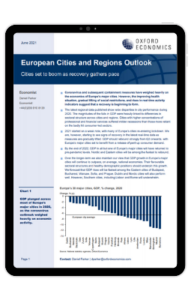Europe | Cities set to boom as recovery gathers pace

Coronavirus and subsequent containment measures have weighed heavily on the economies of Europe’s major cities. However, the improving health situation, gradual lifting of social restrictions, and rises in real-time activity indicators suggest that a recovery is beginning to form.
What you will learn:
- The magnitudes of the falls in GDP were heavily linked to differences in sectoral structure across cities and regions.
- . GDP should rebound strongly from Q2 onwards, with Europe’s major cities set to benefit from a release of pent-up consumer demand.
- Over the longer-term we also maintain our view that GDP growth in Europe’s major cities will continue to outpace, on average, national economies.
{% video_player “embed_player” overrideable=False, type=’scriptV4′, hide_playlist=True, viral_sharing=False, embed_button=False, autoplay=False, hidden_controls=False, loop=False, muted=False, full_width=False, width=’1920′, height=’1080′, player_id=’50023803233′, style=” %}
Tags:
Related Services

Post
UK: Supply constraints are probably less prominent in the south
The extent to which UK employers can respond to likely 2024 interest rate cuts with increased output, rather than rises in prices and wages, will partly reflect the extent of spare capacity. This will inevitably vary by region. Evidence on this is imperfect, but in terms of capital assets (including intangibles) and labour availability, southern regions appear to be in a stronger position than those in the UK's traditional industrial heartland.
Find Out More
Post
Global Private equity real estate fund maturities spur asset sales
We expect the significant increases in fund maturities, spurred by capital raised over the past decade, to exert upward pressure on the rate of asset disposals as the funds approach the end of their lifecycles.
Find Out More